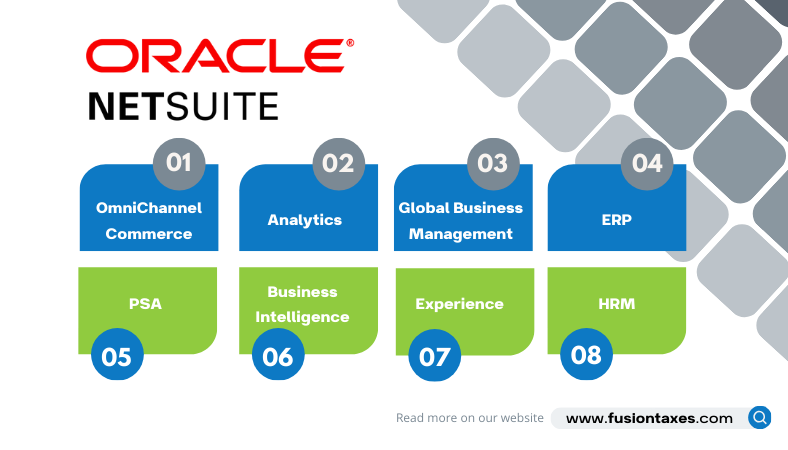Key Takeaways
- Learn what to consider when selecting the NetSuite configuration that fits your business goals and workflows.
- Discover how expert guidance and clean data preparation streamline implementation and help your team get up to speed faster.
See how a thoughtful NetSuite rollout creates a foundation for accurate, reliable financial reporting.
What Is NetSuite and Why Does Implementation Matter?
NetSuite combines ERP, CRM, and e-commerce tools in a single cloud-based system. Its functionality is vast, spanning financial management and inventory tracking to multi-state compliance and more. But to unlock its full potential, you need a considered implementation to align the software to your unique business processes, compliance requirements, and growth goals.
How a NetSuite Implementation Can Benefit You
With the right setup, you can:
- Consolidate accounting, financial planning, inventory, and e-commerce on one platform.
- Improve efficiency with real-time visibility into financial performance.
- Align your setup with GAAP guidelines and IRS reporting standards.
- Customize your system with NetSuite modules tailored to your industry and business model.
Follow this 4-step NetSuite implementation checklist to set up your system confidently and avoid common pitfalls.

1. Decide on the Best NetSuite Package for You
NetSuite isn’t a one-size-fits-all product; it’s a flexible platform with multiple packages, license types, and modules you can combine to fit your business. Whether you need core accounting features or advanced tools for inventory, CRM, and e-commerce, selecting the right mix upfront is essential for controlling costs and maximizing ROI. You can start with the essentials and build up your plan as your business grows, tailoring it to match your processes and priorities.
When selecting packages and licenses:
- Analyze which modules align with your processes.
- Avoid paying for features you won’t use.
- Determine license types for each user:
- Full User License
- Employee Self-Service License
- Read-Only Access
Learn about NetSuite’s Modules
2. Choose the Right NetSuite Implementation Teams
Appointing the right internal team to work alongside NetSuite-certified experts is one of the most important steps to ensure a smooth transition and full use of NetSuite’s capabilities. The combination of in-house knowledge and external expertise helps you avoid costly missteps and accelerates adoption across your organization.
Internal Team:
- Select team members who embrace technology
- Ensure they understand the NetSuite features most relevant to business workflows.
- Empower them to act as champions who can train others and maintain momentum after go-live.
External Partners:
- Choose advisors who start by mapping your business goals and workflows – so your NetSuite setup aligns with your long-term strategy, not just short-term fixes.
- Work with specialists who combine technical expertise and regulatory knowledge to configure modules, tax rules, and reporting accurately for your industry.
- Partner with a team that offers structured implementation and post-launch support to keep your system evolving as your business grows.
The best asset in any implementation? An expert who knows how to translate complex requirements into a practical, scalable system. Talk to one of our NetSuite-certified CPAs today.
3. Get Your Data in Order
Preparing clean, accurate data before migration is essential. Incomplete or inconsistent records can lead to reconciliation issues, compliance risks, and costly rework after go-live. Reliable datasets make it easier to map fields correctly, automate workflows, and generate trustworthy reports from day one.
Before migration:
- Review and clean inventory records to avoid discrepancies in stock levels and valuation.
- Validate customer and employee data to ensure accuracy in transactions and permissions.
- Confirm forecasting and sales data integrity so projections reflect reality.
- Prepare payment processing records for seamless integration.
- Plan automated reporting setups that match your business’s specific requirements.
4. Consider the Right Time to Transition
When you migrate to NetSuite is critical because it directly impacts how smoothly your teams adapt to the software and how accurately your data migrates. A rushed transition during busy periods can lead to costly errors.
When planning your transition:
- Schedule migration well before tax season or major reporting deadlines.
- Align the timeline with lower operational workloads if possible.
- Build in time for thorough system testing and user training.
Frequently Asked Questions
- What is the most important part of a NetSuite implementation?
Careful planning and clean data preparation are essential to avoid errors, delays, and low adoption rates during migration.
- Do I need a NetSuite consultant for implementation?
While it’s possible to implement NetSuite internally, working with an experienced consultant helps avoid pitfalls and ensures the system is configured to fit your business needs.
- What is the best package for me?
The best package depends on your size, industry, and goals. NetSuite offers flexible modules and license types that can be tailored to your workflows. Everything from core financials to advanced inventory, CRM, and e-commerce features. A NetSuite-certified professional can help you assess your requirements and build the right plan for your business.
An intentional NetSuite implementation is an investment in your business’s long-term success. If you’d like help navigating the process, our experienced team of NetSuite-certified Controllers can help you set up, integrate, and optimize NetSuite so it works seamlessly for your operations.
_______________________________________________________
This blog article is not intended to be the rendering of legal, accounting, tax advice, or other professional services. We base articles on current or proposed tax rules at the time of writing and do not update older posts for tax rule changes. We expressly disclaim all liability in regard to actions taken or not taken based on the contents of this blog as well as the use or interpretation of this information. Information provided on this website is not all-inclusive and such information should not be relied upon as being all-inclusive.


